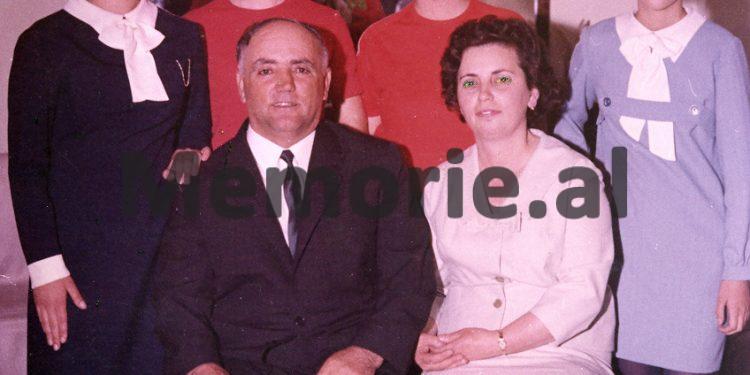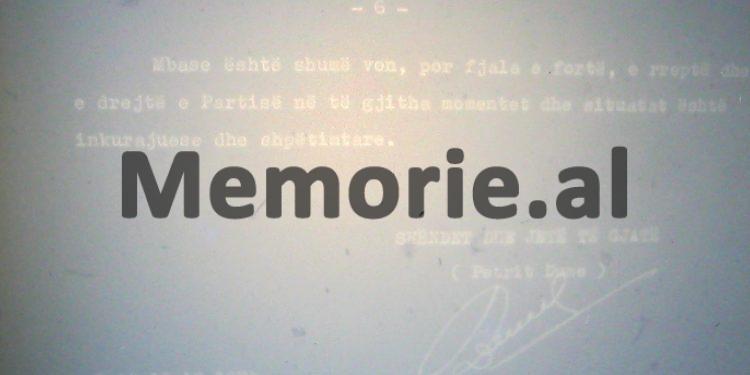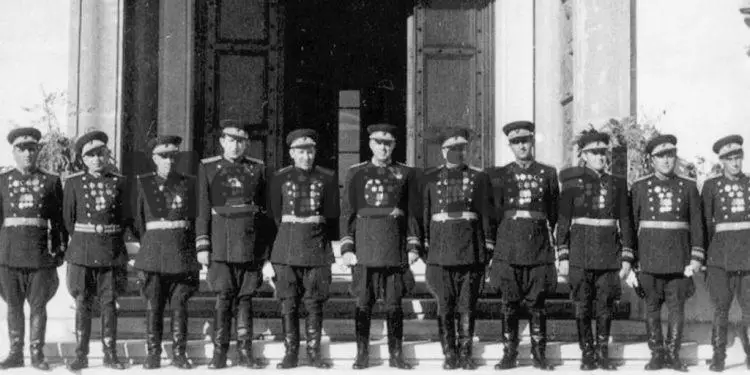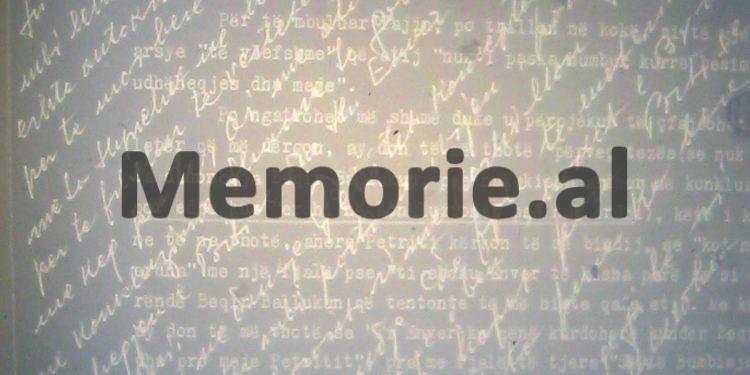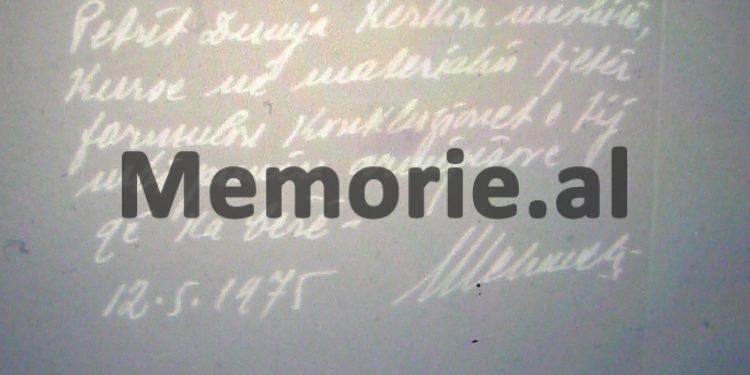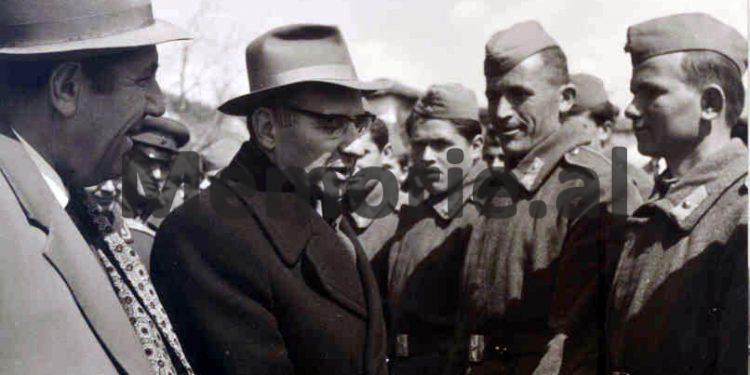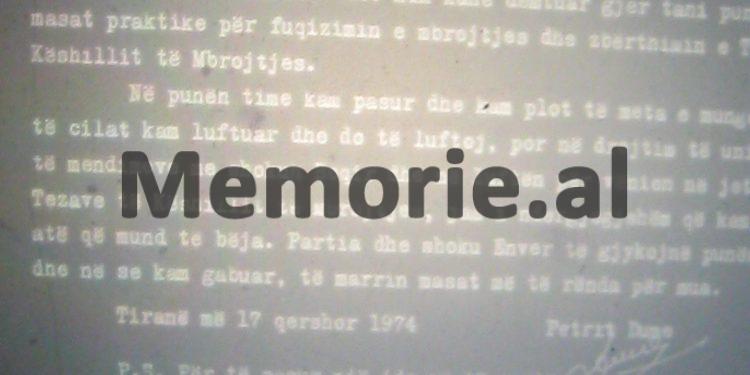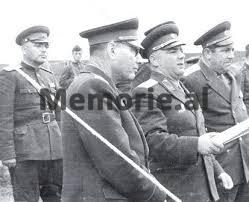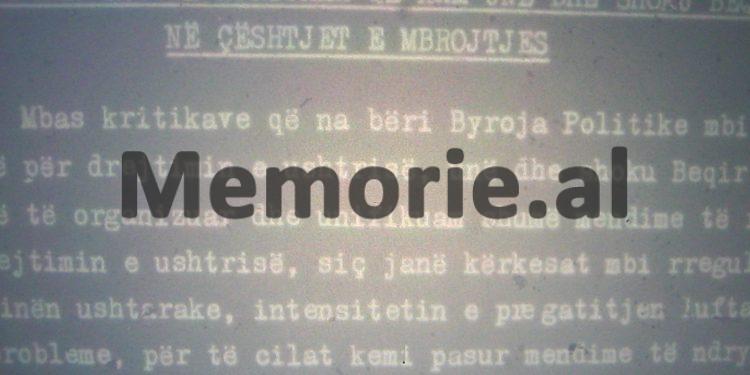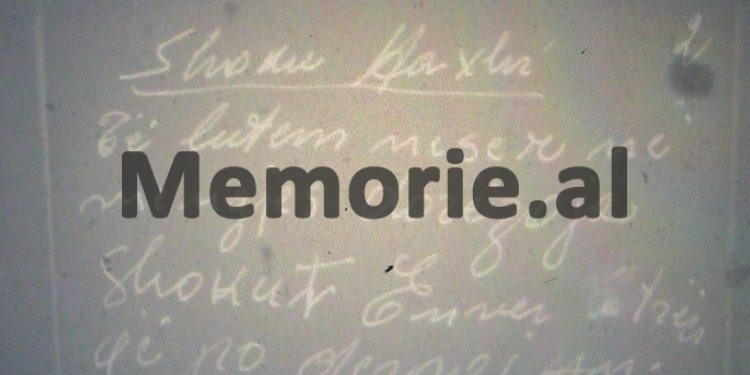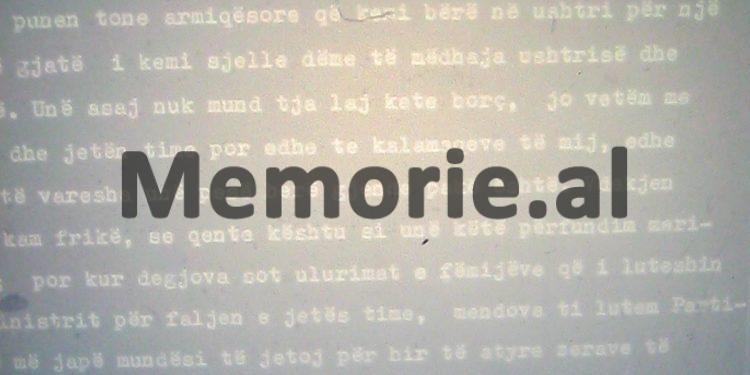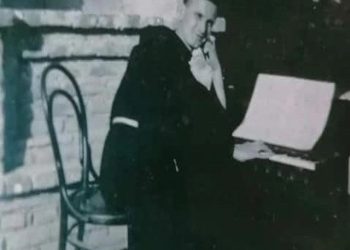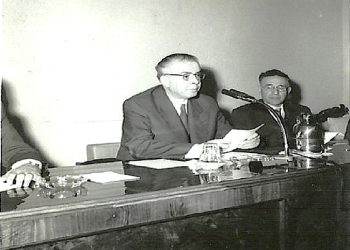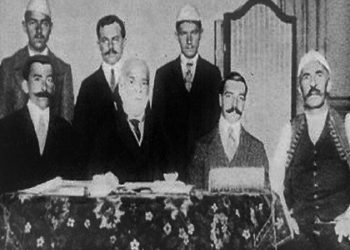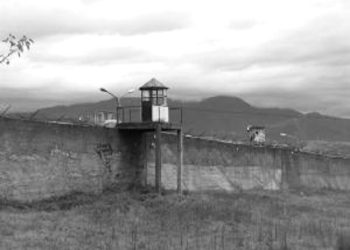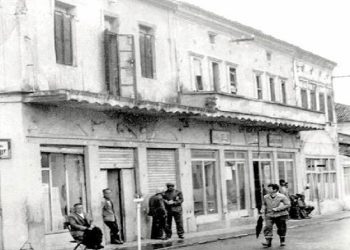Dashnor Kaloçi
Memorie.al publishes two unknown letters of the former Chief of General Staff of the Albanian Army, at the Ministry of People’s Defense, Petrit Dume, sent to the first secretary of the Central Committee of the ALP, Enver Hoxha, dated 17 June and October 16, 1974, which deals with the deep disagreements and contradictions that the Chief of Staff had with the Minister of Defense, Beqir Balluku, regarding their several years of work at the helm of the Army and their concepts on the theses of the Council of Defense, etc. All the accusations of Duma against Minister Ballluku, the opinions given by other senior military men to the contradictions of their two chiefs, Enver’s response to the letter of Duma, as well as the attitude of Hysni Kapos and Mehmet Shehu to the letter of Petrit Duma, which did Enver send them to ask for their opinions ?!
“In these materials that are defended by Comrade Beqir, there are other distorted and dangerous views, about which both I and Comrade Hito, have constantly raised their voices in front of Comrade Beqir, but he has not heard us and in this way has influenced a large number of cadres to become acquainted with these views. The important thing is that in most cadres the theoretical materials that touch on our concepts, even if elaborately, have been rejected. Many times I have raised the problem before Comrade Beqir that we do not need new theories that do not go, that our theory is complete, clear and appropriate to our conditions, as the Party and Comrade Enver instructed us, work and our task is to bring them to life. He agrees in principle, but continues to retain in himself some concepts that do not match ours and that he occasionally gives these concepts to various cadres and groups to elaborate. This is stated, among other things, in a letter sent to Enver Hoxha, by Petrit Dume, Chief of General Staff of the Albanian Army at the Ministry of Defense, who holds on June 17, 1974, where he tries to explain to the Commander-in-Chief about the deep disagreements and contradictions he had with the Minister of Defense, Beqir Balluku, which had started years ago. The letter in question of the former Chief of Staff, Petrit Dume, coincides with the period when Enver Hoxha had just started the crackdown on Minister Balluku, (who for years also held the post of first deputy prime minister in the government headed by Mehmet Shehu), strike which began in the Army asset that was held in June of that year in the former villa of Zog in the city of Durres, to then exclude him from all party and state functions in the Plenum of the Central Committee of the ALP that was held on July 25, accusing him of being “the leader of a coup group in the army”, which preceded his arrest on December 7, when he was interned in Selenica, Vlora. And throughout this time period of the process of ousting Balluk in the second half of 1974, paranoidly exploiting the disagreements and contradictions that the three top heads of the Ministry of Defense had between them, Enver used the two deputies of his, Petrit Dumen and the Director of the Political Directorate of the Army in the Ministry of Defense, Hito Çako, “exchanging” them first with Balluku and then would accuse them as his closest collaborators! In this context, there are two letters of Petrit Dume sent to Enver Hoxha, which bear the dates of June 17 and October 16, 1974, which Memorie.al publishes in full starting from this number, together with the correspondence of Enver with Hysni Kapo and Mehmet Shehu, to whom he “asked for their opinion”, for the sentencing of Balluk, Petrit Dumes and Hito Çakos!
Letter to Enver Hoxha, sent by the Chief of General Staff, Petrit Dume 1970, today we have common thoughts and our work is going better than in the past.
RELATIONSHIP ON SOME DIFFERENT OPINIONS I HAVE AND COMRADE BEQIR ON MILITARY ISSUES
After the criticisms made by the Politburo on our shortcomings in the work of leading the Army, Comrade Beqir and I started a more organized work and unified many important thoughts on the leadership of the Army, such as the requirements on military rules, the intensity of combat training, etc. . For these problems on which we had different opinions, before 1970, today we have common opinions and our work is going better than in the past.
I find it necessary to report to the Central Committee, the Defense Council and Comrade Enver, that in terms of defense problems in many ways, Comrade Beqir and I have different opinions that definitely damage the unity and the work of the military leadership at the center. What do these different opinions consist of?
a) In the work problem of further development of war theory.
b) In our fight and insistence on dismantling the Defense Council theses and putting them into practice. As for the problem of further development of the theory, I start from the orientation of the Party that in this regard to dominate collegiality, initiative and goal, so I think that first of all the problems to be studied should be determined, opinions should be exchanged between we three key friends and then approve theses and assign working groups or apparatus to work out the problems.
All the work of elaborating the theory should be focused on the General Staff and after the study is over, again in a collegial way, study the material with the three main friends and after flattening the thoughts, throw the material into discussion.
If the material provided relates to changes to existing concepts, discussion of the problem should only be made with the approval of the Defense Council. This path seems to me right and only in this way can we work continuously and usually for important problems in the Headquarters of Generally, in directorates and commands of types of weapons. In this regard, Comrade Beqir Balluku has serious shortcomings. He for many problems of theoretical thought does not follow this rule, does not give precise orientations, does not discuss them beforehand with me and Comrade Hito, and does not put the General Staff in the direction of this elaboration. Comrade Beqir, has done many studies behind closed doors, keeping direct contact only with the processors and instructing them not to inform either the direct bosses or me. Processing is done in inappropriate places, using highly secret materials and documents, out of any order and control and in unsafe premises.
In this way, Comrade Beqir has led the elaboration of many theoretical materials of which we were aware and when we signaled that these actions are not right, he did not react correctly and continued to err in this regard. This is what he did when he tried to prepare a theoretical material in 1966, this is how he prepared the theoretical material in 1971, 1972 and 1973. All three of these studies were prepared without the knowledge of the Chief of General Staff and the Political Directorate, using officers. Of our apparatus, but ordered not to keep us electrified.
When Comrade Beqir was told that these things were unfair and that I should know what was being done and what was being done, he replied that ‘you will look at the materials when they are finished’.
For the implementation of the theses of the Defense Council and for their dismantling, Comrade Beqir in many cases has not done an organized and persistent work, has left a shaky impression, saying that the theses are very broad, contain many details and that they should be sharply cut and squeezed.
What is worse is that some materials elaborated under the direct direction of Comrade Beqir, hit the content of the Theses in one way or another, create theoretical confusions and distort the practical actions of the troops in the war. These materials that according to the moments have sometimes been blocked and sometimes have appeared, do not treat everything crookedly, among them there are many problems that arise straight, but at their core there are dangerous views on our strategy. For example in two or three theoretical materials the problem arises to acquire a mobile defense and to devalue the active positional defense, the views are thrown that our troops in defense should attack and not counterattack, strike and not counterattack. But these shows are in flagrant contradiction with the concepts of our strategy, they turn our army from the first days of the War from a regular army, to a partisan army!
In these materials defended by Comrade Beqir, there are other distorted and dangerous views, about which both I and Comrade Hito have constantly raised our voices before Comrade Beqir, but he has not listened to us and in this way has influenced a large number of cadres to become acquainted with these views. The important thing is that in most cadres the theoretical materials that touch on our concepts, even if elaborately, have been rejected.
Many times I have raised the problem before Comrade Beqir that we do not need new theories that do not go, that our theory is complete, clear and appropriate to our conditions, as the Party and Comrade Enver instructed us, work and our task is to bring them to life. He agrees in principle, but continues to retain in himself some concepts that do not match ours, and that he occasionally gives these concepts to various cadres and groups to elaborate.
Today in the Ministry of Defense there are many such elaborations for which a lot of time and people have been spent, but the bad thing is that these materials are carefully beaten by comrade Beqir and he refuses to harshly criticize the processors, who keep those thoughts and can display them when they find the opportunity. The problems I raised in this report are documented in very voluminous material, but I tried, at the behest of Comrade Hysni, to raise only a few key issues to understand the change in our views on defense matters.
I am convinced that these unjust concepts have not gone down, they are in the heads of very few people here in the center, especially Comrade Beqir, Comrade Rrahman and Spiro Shalesi. They have so far not damaged the work and practical measures for strengthening the defense and dismantling the theses of the Defense Council. In my work I have had and I have full of flaws and shortcomings, with which I have fought and will fight, but in terms of unifying thoughts with Comrade Beqir and the fight to implement the Theses of the Defense Council, I am aware that I did what I could do. The party and Comrade Enver to judge my work and if I was wrong, to take the heaviest measures for me.
Tirana, June 17, 1974
Postscript To have a clearer idea of the dangers of the theoretical materials presented in 1973, as well as the assessments made by the main cadres of this material, I am presenting only the main criticisms to Comrade Enver.
Petrit Dume
Principled criticisms of the theoretical material by some friends
- Comrade Hito Çako
Of all the problems dealt with in this material, the most unconventional and with serious flaws, which contradict the principles of theses, which any of these principles do not develop, but frontally correct, is the chapter where you talk about defense. In this chapter, in my opinion, not one, but the whole essence of the thesis principles for positional and active defense in fortified and highly fortified regions, are considered outdated, as principles that our accumulated experience so far makes it necessary to move from these thesis principles for active positional defense in the principle of “mobile” maneuvered defense.
2. Comrade Bako Dervishi
The submitted material is completely contrary to the theses of the Defense Council, this material does not reflect the theses. The ideas presented by Comrade Enver Hoxha about the problems of the army in the presented materials were not interpreted correctly; somewhere taken and somewhere opposed. Concepts on defense operations require thorough revision, the solution of which depends more on the concepts of other types of combat. The material widely distributed and the units for study, created perversion, arouses distrust in the application of the concepts of martial arts theses to the tone we apply today.
3. Comrade Muhamet Prodani
I think we are still in the application of these theses and things have come up and are constantly coming out that require definition and reformulation. We have always looked at them critically, always studying the situation in reality when applying the thesis requirements, and it is not at all true and reasonable, the criticism made by the comrades on page 4, addressed to the cadres of the comrades of the Army , because, I think, we have no basis to overturn the theses, even in the forms and methods of combat. It is by all means strange when attacking and striking are argued. They ignore the defense, go into free, partisan action, give up the front and not only has no decisive purpose, but as I said, there is no influence on the front, they lead to partisan struggle without the front from the beginning. The material does not contain changes in the forms of combat in relation to the theses, but is absolutely the opposite of theses, in essence.
4. Comrade Abaz Fejzo
The material is very broad and tries to give principles, which do nothing but duplicate the Defense Council Theses. It would be good to briefly state in the material which issues of the Defense Council the authors do not agree with. Comrade Enver emphasizes that the Defense Council has given the Defense Council Theses, which are generally fair, i.e., are the basis of the principles of our popular martial art.
5. Comrade Sulo Kozeli
The material has scientific study value, despite the shortcomings. The material is prevalent and has no boundaries, viz. which parts of the theses it deals with, from where to where, which has made it confusing and in many cases repetitive, confusing. The question arises: Should we make another material and then, through a discussion, turn it into another type of thesis, even for some specific issues, or should we take as a basis the thesis of the Defense Council and their specific issues? ‘We discuss. It would be better to discuss specific issues. The other way to officially, or unofficially turn the material into new theses, only brings harm.
6. Comrade Andon Sheti
It draws our attention to the fact that in the material the highest form of activity are considered lightning and surprise attacks and shocks and not k / attacks and k / shocks. Here we are dealing with a new conception, which brings other changes for which theoretical explanations are given in the material. In addition, the material states that k / attacks and k / kings should be given not with decisive purposes, but with limited purposes.
7. Comrade Vehip Alikaj
Striking actions as well as attack as well as counterattack and counterattacks we think that as they are treated in the material, they replace each other, it is not clear how one is done and how the strike is done and how the counterattack is done, which takes place before and which then, what are the forces and means in one and the other and their tasks.
8. Comrade Tefik Ruci
In the material (pp. 25-26), it is stated that the main purpose of defense should not be to persistently keep the region (belt-terrain), occupied for the consumption of enemy damage, but the activity (maneuver), consequently and the main forces and tools should be used, not for the maintenance of the defensive regions, but for the development of the activity, (maneuver). This statement (definition) in the first place contradicts the requirements and theses of the Defense Council. Our country is small, where should we go if we did not keep every inch of land at all costs? They contradict the teachings of Comrade Enver Hoxha in the 12th Plenum of K.Q. of the ALP of June 1971, which states: “To implement his tactics and strategy, the enemy needs space.”For this he will try to stand up, concentrate his forces on attack.” How do we understand activities without a sole, or with a weak sole?
9. Comrade Petrit Dume
You have worked badly, in vain, you have wasted two years, you have engaged the most capable forces of the institution and you have given us a confusing material, which does not suit us at all and which contradicts the theses. This material is being returned by me for the third time, always being the same, it even played a lot of the theoretical material presented in Durrës, before the theses came out and were rejected. It is enough to read from pages 3 to 7 to see all the disadvantages of this material.
You wanted to do what you could not and would not do, for it is much better. To dissect theses, concretize them and enrich them, but not to overturn them, the latter if necessary is done when we get orientation to do them. In the material what is good and right is taken from the theses, what has come out of the heads of the authors, is bad. We should not convince others with dreams and fantasies.
Read well Comrade Enver in the 12th Plenum in bulletin No.3, in the last speeches, in the meeting with the Chinese delegation, in the instructions for the “Drini” exercise, for the other protocols of K.M. and you will see that he says to enrich the theses, to dissect, etc. The material is worthless, it is dangerous and the authors should be severely criticized and followed in their work so as not to introduce us to such distortions in our art.
Comrade Beqir
Since we are in front of a very important meeting and which is organized with the instructions of the Central Committee and the Defense Council, it would be necessary in addition to the problems that arise in the report, to make a stronger emphasis in terms of appropriation, implementation and development of Defense Council Theses.
Criticize the concepts of some friends who, with persistence and regardless of our remarks and orientations, elaborate concepts and methods that directly or indirectly undermine the strategy and tactics presented in the theses and that life is approving and defining every day.
It is time for this criticism to be made because now this work is boiling in the main cadres, who without your knowledge and approval and mine, have received the material. In addition, despite the fact that the material is not accepted, these concepts are in the minds of these comrades who play a very important role in the elaboration of the theory and practice of our martial art and if we make concessions and do not restrain them, confusion and doubt will be created in the country’s defense strategy.
Note
These are the opinions of some key cadres regarding the black material of Beqir Balluku. /Memorie.al
Pandi Dini
Continues tomorrow




